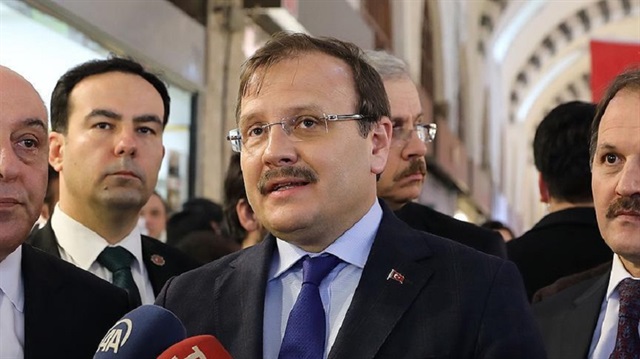
Around 900 FETÖ and DHKP-C terrorists taking shelter in Greece, says Turkish Deputy PM Hakan Çavuşoğlu
Turkish Deputy Prime Minister Hakan Çavuşoğlu on Friday criticized a Greek court for rejecting an extradition request of one of nine Turkey-based far left terrorists.
“We have information about the existence of many [terror] camps, names of some of them are known by public. We don’t want Greece to be a country that aids and abets terrorists and terrorism,” Çavuşoğlu told reporters in Istanbul.
The reaction of Turkish deputy premier came hours after a Greek court refused to approve the extradition of one of nine Turkish citizens accused of being members of the DHKP-C terrorist group.
The far-left terrorist suspects had plotted to assassinate Turkish President Recep Tayyip Erdoğan during his visit to Greece last December, Greek media reported after their arrest last year.
“As much as we know, FETÖ [Fetullah Terrorist Organization’s] terrorists as well as DHKP-C terrorists are taking shelter in Greece, this number could be around 900, we particularly know that FETÖ members are there,” he said referring to a group behind the 2016 defeated coup in Turkey.
"In this context, we had not given any possibility that Greece will host these terrorists who target Turkey’s existence, integrity and nation. I would like to express that our hope is damaged after these decisions are made."
The ruling alleges that if the DHKP members were handed over to Turkey their life would be in danger.
The minister said it is an “irony” that the Greek authorities did not voice concern while sending Syrian refugees back to Turkey, but they talk about torture and malnutrition while giving rulings on extradition of terrorists.
The Greeks' appeals court ruled in line with prosecutors’ suggestion, denying Ankara’s extradition request on the grounds that Mehmet Dogan has been recognized as a “political refugee” by French authorities.
Dogan was arrested last November in Athens along with eight more Turkish nationals and accused of forming and participating in a terrorist organization and possessing explosives and weapons unlawfully, among other charges.
Ankara has requested the extradition of at least two of the accused. The second extradition request will be heard in court next Tuesday, Feb. 6.
The refusal of Greek courts to extradite to Turkey accused terrorists -- notably eight ex-soldiers accused of taking part in the 2016 defeated coup in Turkey -- has added strains to ties between Ankara and Athens.
Hello, the comments you share on our site are a valuable resource for other users. Please respect other users and different opinions. Do not use rude, offensive, derogatory, or discriminatory language.
The floor is all yours.








